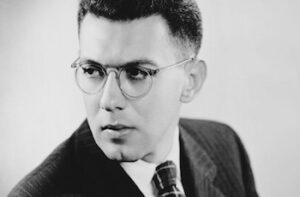
Herbert Hill
*Herbert Hill was born on this date in 1924. He was a white Jewish-American public policy activist, professor, and labor director.
Herbert Hill was born into a Jewish family in Brooklyn, New York. He attended public schools. Hill earned a B.A. from New York University in 1945 and attended the New School for Social Research from 1946 until 1948, where he studied under the distinguished political theorist Hannah Arendt. During the 1940s, Hill was a member of the Socialist Workers Party. In 1951, he was appointed Labor Director of the NAACP, where he worked until 1977 when he departed for a professorship at the University of Wisconsin Madison.
He was later Evjue-Bascom Professor of Afro-American Studies and Industrial Relations and eventually emeritus. He played a significant role in the American Civil Rights movement, pressuring labor unions to desegregate and seriously implement measures to integrate African Americans into the labor market. He was also famous for his belief that American trade unions had downplayed the history of racism that tarred their reputations before and after the Jim Crow era. He was highly critical of the practice of nepotism in many unions whereby relatives of members were hired. Hill criticized labor relations practices in numerous industries, including the film industry, as well as the progress of the Kennedy Administration on issues of racial equality in the workplace.
Among the unions he criticized for their record on racial equality were the International Ladies Garment Workers Union, the United Auto Workers, the United Federation of Teachers, the United Steelworkers of America, and the AFL-CIO federation itself. Hill particularly objected to the AFL-CIO position that Title VII of the Civil Rights Act of 1964 should not interfere with existing seniority systems. He was also a strong supporter of affirmative action. He also organized pickets to raise awareness of racial segregation in the construction industry.
His conduct was controversial, but the NAACP leadership under Roy Wilkins supported Hill. He published over one hundred articles in journals, anthologies, and newspapers and was known for polemics against labor historian Herbert Gutman. He also consulted for the Equal Employment Opportunity Commission and the United Nations. One of the most important campaigns led by Hill was his campaign against the discriminatory practices of the International Ladies' Garment Workers' Union (ILGWU). Even though the ILGWU had cooperated with the NAACP to desegregate union locals in the South, as late as the early 1960s, there were still no African American nor Puerto Rican officers or executive board members in the ILGWU in its New York City base.
The ILGWU was essential because of its major role in the Liberal Party of New York. Hill played a key role in taking on a complaint against Local 10 of the ILGWU of a Black cutter, Ernest Holmes, who had been repeatedly prevented from joining the cutters' union, thereby receiving lower wages and denied the health and welfare benefits associated with union membership. Hill alleged that the ILGWU restricted African American and Puerto Rican workers to low-paying jobs. In 1962, the New York State Commission for Human Rights found that Local Ten had violated the state anti-discrimination law. The ILGWU launched a public relations campaign alleging partisanship on the part of the Republican-appointed Commission in response and did little to solve the problem.
Writing in New Politics, a leading ILGWU official, Gus Taylor, attempted to show that there were African Americans and Puerto Ricans in the union. Adam Clayton Powell Jr. held Congressional hearings in the House Committee on Education and Labor on the ILGWU practices in 1962. Hill testified and criticized David Dubinsky for his governance of the ILGWU. Changes to the ILGWU only came about slowly, especially after the retirement of Dubinsky in 1966. Herbert Hill died on August 21, 2004, in Madison, Wisconsin, after a long illness.